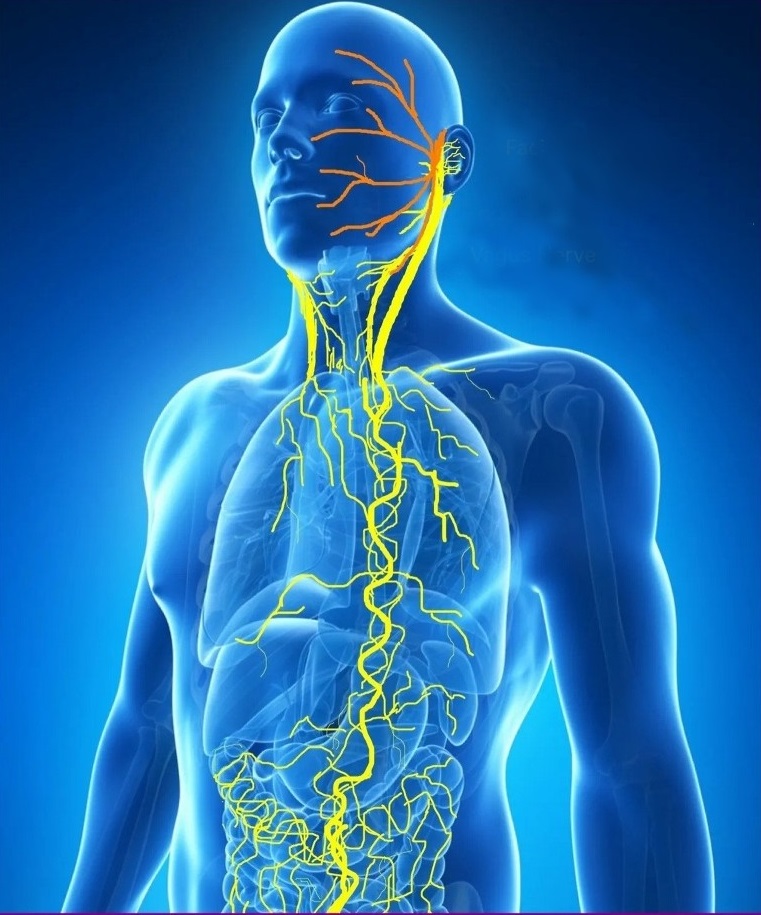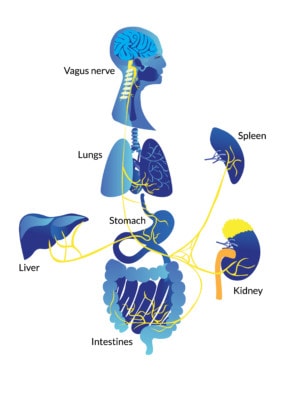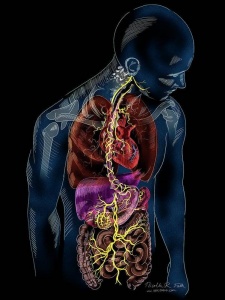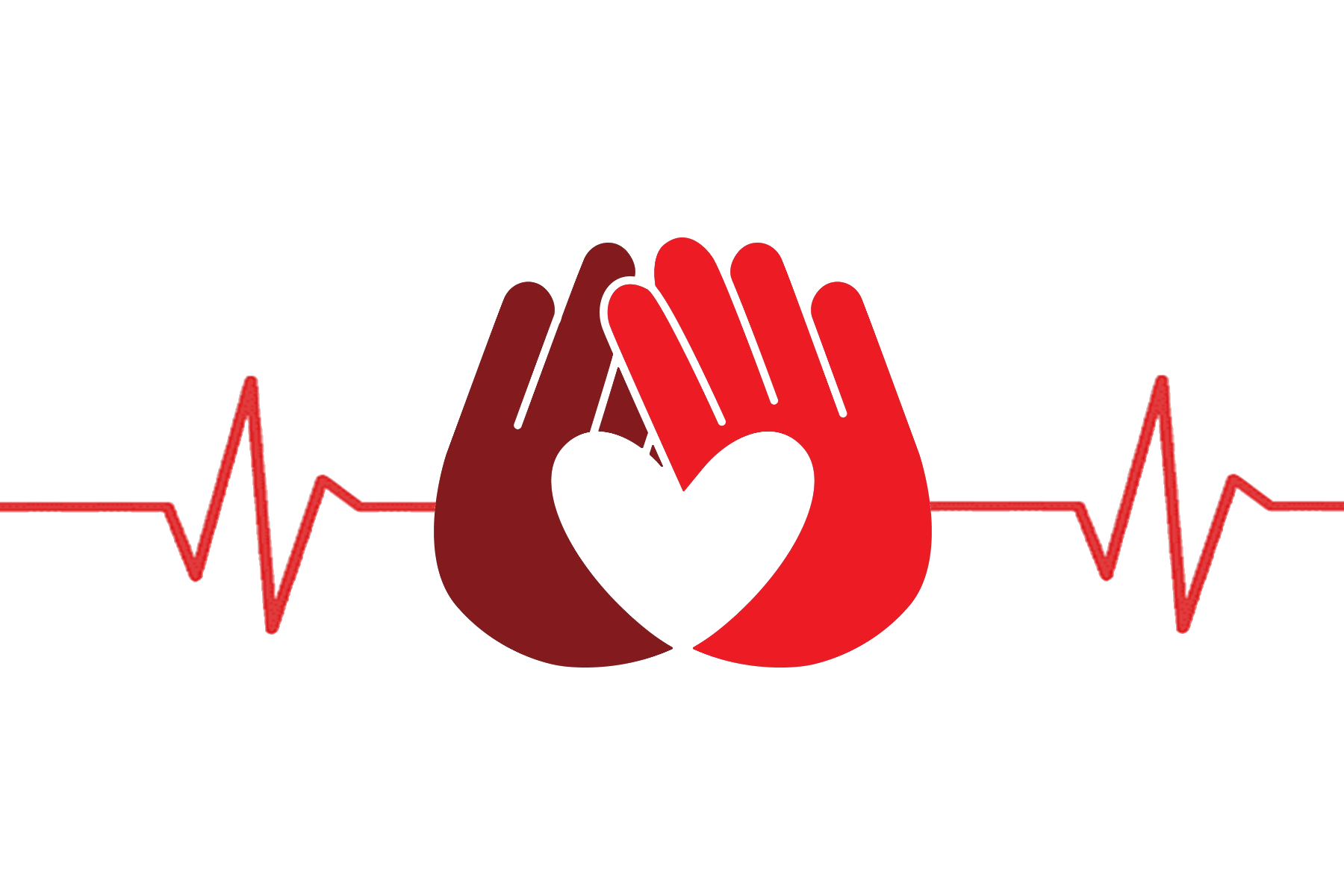WHAT IS THE VAGUS NERVE AND WHY IS IT SO IMPORTANT?
 There are 12 cranial nerves which work in pairs, connecting the brain to other areas of the body, such as the head, neck, and torso. Many cranial nerves have either sensory or motor functions, but the 10th cranial nerve, known as the vagus nerve, has both sensory and motor functions, and connects the brain to the neck, chest and abdomen. It is the longest and most complex of the cranial nerves, extending from the brain to the colon, transmitting information between the brain and organs/tissues around the body.
There are 12 cranial nerves which work in pairs, connecting the brain to other areas of the body, such as the head, neck, and torso. Many cranial nerves have either sensory or motor functions, but the 10th cranial nerve, known as the vagus nerve, has both sensory and motor functions, and connects the brain to the neck, chest and abdomen. It is the longest and most complex of the cranial nerves, extending from the brain to the colon, transmitting information between the brain and organs/tissues around the body.
The functions of the vagus nerve work with the parasympathetic and sympathetic parts of the autonomic nervous system, helping to enable sensory activities and transmit motor information for movement.
VAGUS NERVE SENSORY FUNCTIONS
- somatic components - provide sensory information for the skin and muscles behind the ear, the external part of the ear canal, and parts of the throat
- visceral components - provide visceral sensory information for the larynx, oesophagus, lungs, trachea, heart, and most of the digestive tract. They also contribute to taste near the root of the tongue
VAGUS NERVE MOTOR FUNCTIONS
- stimulates muscles in the pharynx, larynx, and the soft palate, assisting with swallowing and speech
- stimulates cardiac muscles, helping to lower resting heart rate
- stimulates involuntary contractions in the digestive tract, enabling food to move through the tract
BALANCING THE NERVOUS SYSTEM
The autonomic nervous system predominantly consists of the sympathetic, which is responsible for the fight or flight response, increasing alertness, energy, blood pressure, heart rate, and respiratory rate, and the parasympathetic, which the vagus nerve is more involved with. The vagus nerve therefore, contribute to:-
- digestive function
- respiratory function – the vagus nerve connects with the diaphragm, enabling deep breathing which assists with relaxation
- the heart rate, blood pressure and cardiovascular problems - an overactive vagus nerve can lead to the heart being unable to pump enough blood around the body, loss of consciousness and organ damage (in severe cases)
- levels of alertness
- relaxation and feelings of calmness
- defecation
- urination
- sexual arousal
- reflex actions eg coughing, sneezing, swallowing, vomiting
- inflammation – the vagus nerve sends anti-inflammatory signals to other parts of the body
THE GUT-BRAIN INTERFACE
The vagus nerve provides a link between the gut and the brain, making it an important factor in conditions such as obesity, depression and trauma. The information transmitted from the gut to the brain, is linked to coping mechanisms for stress, anxiety, and fear, and when this is combined with high adrenaline levels as seen in PTSD clients, this can be an important factor in whether a client remains in survival mode. It also explains why so many clients with unresolved trauma and PTSD also suffer with conditions such as irritable bowel syndrome.
 PROBLEMS ASSOCIATED WITH A DYSFUNCTIONAL VAGUS NERVE
PROBLEMS ASSOCIATED WITH A DYSFUNCTIONAL VAGUS NERVE
- difficulty speaking
- loss or change of voice
- difficulty swallowing
- loss of the gag reflex
- low blood pressure
- slow heart rate
- changes in the digestive process
- nausea or vomiting
- abdominal bloating or pain
- depression and anxiety in people with breathing problems or heart disease
- gastroparesis, particularly in insulin dependant diabetics who are at higher risk of damage to the vagus nerve
- vasovagal syncope – an overactive vagus nerve can cause a sudden drop in heart rate and blood pressure, resulting in fainting. This can also happen in stress induced cardiomyopathy or those suffering from extreme stress, where adrenaline levels are high.

VAGUS NERVE STIMULATION
The vagus nerve can be stimulated in the following ways to assist with conditions that don’t respond to other treatments.
- diaphragmatic breathing techniques
- cold water immersion of the face
- the use of transcutaneous VNS devices
- vagus nerve exercises
- biofeedback
- yoga
- loud gargling with water
- massage behind the earlobes or from collarbone up the side of the neck
- reflexology
- eating fibre stimulates vagus impulses to the brain slowing the gut movements
- laughter
Vagus nerve stimulation is thought to assist with conditions such as:-
- depression and bipolar
- metabolic disease
- heart disease
- PTSD
- epilepsy
Research is also being done to look into the effects of vagal nerve stimulation in cases of :-
- alzheimers
- Parkinsons
- rheumatoid arthritis inflammation
- heart failure
- inflammation from diabetes mellitus
- intractable hiccups
- abnormal heart rhythm
- inflammation from Crohn’s disease
